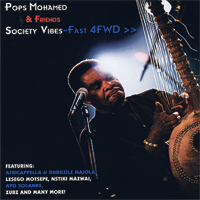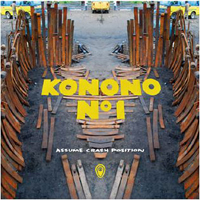From the legendary Pops Mohamed to Côte d’Ivoire’s rising female superstar, Dobet Gnahoré, we review the latest African music releases.
Dobet Gnahoré: Djekpa La You (Contre Jour) 
Following on her fantastic 2007 album, Na Afriki, comes the latest offering from Côte d’Ivoire’s rising female superstar, Dobet Gnahoré. Titled Djekpa La You, Gnahoré’s third album picks up where the second left off, adding a more uptempo selection of songs to her repertoire. Gnahoré was born in 1982 in Côte d’Ivoire and later relocated to Marseille at the age of 17 to escape the civil war that had torn through her home country. There she met French guitarist Colin Laroche de Féline. After years of touring Gnahoré finally released her debut solo album, Ano Neko, in 2004, which earned her the title of best newcomer at the World Music Awards. Since then her sound has branched out, incorporating the sanza, the balafon, the calabash and bongos into the mix as backing for the guitar and vocals. On stage Gnahoré is electric and she has a riveting presence, owing mainly to her years of theatrical and choreographic work. On the whole, Djekpa La You is another solid release from one of Africa’s rising female stars. The highlight has to be Kokpa, which features Vusi Mahlasela. — Lloyd Gedye
Pops Mohamed: Society Vibes_Fast 4WD >> (Sheer) 
The list of credits on Pops Mohamed’s latest album, Society Vibes_Fast 4WD>>, is a long and miscellaneous one. It includes hip-hop artist Zubz, spoken-word poet Ntsiki Mazwai, guitarist Glen Mofoko, vocalist Omar Kouyate, kora player Noumoukounda Cissoko and several others. The result, as you would expect, is a motley, but at times bewitching, concoction. The opening tracks, not the most accomplished of songs, show the youthful exuberance brought in by people such as Zubz, Mazwai and Siphokazi Willie. It’s a fusion of more traditional Afro-pop rhythms with urbane hip-hop styles, but I preferred the latter tracks, Baxoleleni, Closer to Luv and The Wolf Song — songs with few or no vocals and on which the kora is the dominant instrument. On these tracks the West African sound rides over the soft, insistent blasts of the flute. Mohamed’s sound is helped by a wide array of instruments — Khoisan mouth bow, jaw harp and even the vuvuzela. — Percy Zvomuya
Konono No 1: Assume Crash Position (Crammed) 
Konono No 1 or, to give them their full title, L’orchestre folklorique TP Konono No 1 de Mingiedi, are said to have existed in some form during the 1960s, but it can definitely be said that the band recorded a track for Zaire: Musiques Urbaines, a Kinshasa compilation album in 1978. But it was only about five years ago that they really hit the big time with the potent release Congotronics. Voice, drums, an odd whistle and the warm, fibrous sound of the likembé — which sounds similar to the mbira — are the band’s building blocks. Assume Crash Position sounds a little more polished than earlier releases, but still includes found sounds from Kinshasa’s streets, as though you were walking past and happened upon a group of musicians gathered in a circle. Their music has a kind of metronomic circularity, or layered trance-like quality, best heard on longer tracks such as Konono wa wa wa or Wumbanzanga — Matthew Burbidge